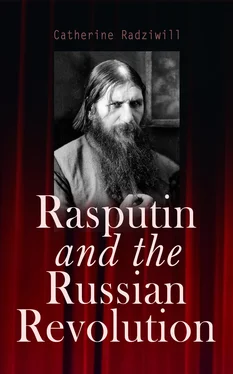Another woman, who had also fallen under the spell of Rasputin, wrote as follows about him:
“I left my parents, to whom I was tenderly attached, to follow the prophet. One day when we were travelling together in a reserved first-class carriage, talking about the salvation of souls and the means to become a true child of God, he suddenly got up, approached me, and * * * proceeded to cleanse me of all my sins. Towards evening I became anxious and asked him: ‘Perhaps what we have been doing to-day was a sin, Gregory Efimitsch?’ ‘No, my daughter,’ he replied, ‘it was not a sin. Our affections are a gift from God, which we may use as freely as we like.’”
Bishop Feofane finally was obliged to recognise the evil which Rasputin was constantly doing, and he bitterly repented having been taken in by him and by his hypocrisy. He reproached himself especially for having given him a letter of recommendation to the famous Father John of Cronstadt, through whom Rasputin was to become acquainted with some of the people who were later on to pilot him in the society of St. Petersburg. The bishop was not a clever man by any means, but he had been sincere in his admiration for Rasputin, a fact which added to the consternation that overpowered him when the truth about the famous sectarian became known to him. He assembled a kind of judicial court, composed of one bishop, one monk and three well-known and highly respected civil functionaries, and called upon the prophet to come and explain himself before this court as to the actions which were imputed to him. Among these figured his general conduct in regard to the women who had enrolled themselves in the ranks of his disciples. But somehow the adventurer succeeded in dispelling the suspicions that had become attached to his name and conduct, and he explained in a more or less plausible manner the things which had been told about him. His leanings towards feminine society, and his invariable custom of bathing with women, he declared to be quite innocent things, and only a proof of his desire to show that it was quite possible for human beings to rise above every kind of carnal temptation.
In spite of this episode, which would have interfered with the career of any one but Rasputin, the fame of the latter grew with every day that passed. He established himself at last in the town of Tiumen in Siberia, where he hired the whole of a large house for himself and some of his most favoured disciples, and he began to turn his activity into another and more profitable channel. He established reception hours every day, when all his followers, admirers and friends could come to speak with him about any business they liked. Hundreds of people used to attend those receptions, among them some very influential persons curious to see and speak with the modern Peter the Hermit, who declared that he had been called by God to save Holy Russia. In some mysterious manner he acquired the reputation of having great influence in high quarters, where (this must be noticed) he was at the time still quite unknown. Governors fearing dismissal, rapacious functionaries whose exactions had become too flagrant, as well as business men in quest of some good “geschaft,” to use the German expression employed before the war among financial circles in Russia, crowded round him, waiting sometimes hours for an opportunity to speak with him, and fully believing in his capacities for obtaining what they required.
Rasputin soon became a kind of business agent and surrounded himself with a number of secretaries of both sexes, whose occupation consisted in attending to his correspondence—he could himself hardly read or write—and in receiving the numerous offerings which were being brought to him daily. These secretaries, among whom figured a sister of the Bishop of Saratoff, Warnava, made an immense amount of money themselves because no one was ever admitted into the presence of Rasputin without having previously paid dearly for this favour. Very soon they established a tax in regard to the audiences granted by their master.
Besides this sister of Bishop Warnava, Rasputin had another female secretary, and they both accompanied him in all his travels, calling themselves his spiritual sisters. They constituted, so to say, his bodyguard, and wherever he went, even in St. Petersburg, they never left off attending him and seeing to all his wants. They were the channel through which everything had to go, and without their consent no one was ever admitted into the presence of the “Saint,” as they already had begun to call him.
Gregory Rasputin very often used to visit Tobolsk, where he was always received with great ceremony and pomp, as if he had been really the important personage he believed himself. The policeman in the streets saluted him as he passed; the carriage in which he drove was escorted or preceded by a high police functionary, and the governor asked him to dinner. The same kind of thing used to take place in other Siberian cities. In one of them the staterooms reserved at the railway station for any high authority on a visit to the place were thrown open to him. In another triumphal arches were erected in his honour, while in a third he was met by deputations in the midst of which could be seen civil functionaries and religious dignitaries.
How all this happened no one knew or could explain. In what consisted the fame of Rasputin and what he had done to deserve all these honours nobody could tell. But fame he had acquired, honours he had obtained, and where another person gifted with a smaller amount of impudence than he was possessed of, would have been put into prison or sent to a madhouse, Gricha had it all his own way, and defied governors and judges with an equal indifference, sure that none among them would be daring enough to try to put a stop to his progress or to his avidity.
Most friendly, not to say intimate, relations were established between Rasputin and Bishop Warnava, especially after the latter’s elevation to the Episcopal See of Tobolsk. The first sermon which Warnava preached in that town he dedicated to the wife of Rasputin. One need not say that the whole clergy of the town and of the diocese trembled before Rasputin, who did not fail to exact from it large sums of money, which he extorted, thanks to the promises which he made but never meant in the least to keep.
During the course of the year 1909 complaints about Rasputin’s behaviour increased to a considerable extent. He was once more called before an ecclesiastical court to give explanations in regard to his general conduct. Among his judges figured again Bishop Feofane. This time Rasputin could not clear himself of the charges preferred against him, and he was invited to retire for one year into a monastery by way of penance. But Rasputin refused to submit to this sentence and categorically declined to do as he had been told. He gave as a reason for his disobedience to the commands of his ecclesiastical superiors that his conscience obliged him to resist because it would be impossible for his “spiritual sisters and daughters” to accompany him in his retreat and live together with him in the monastery they wished him to enter.
At the time this incident took place Rasputin was already living in St. Petersburg, whither he had repaired on the invitation of some of his admirers and protectors, who had the opportunity to listen to his preachings in Kieff and other Russian towns. Among them figured the Countess Sophy Ignatieff, a woman of high standing, irreproachable reputation and great influence in some circles of the capital, where her salon was considered the centre of the conservative orthodox party. Bishops and priests figured among her daily visitors, and it was among her habitués that the most important ecclesiastical appointments in the Empire were discussed. Often it was the candidates whom she honoured with her protection who were chosen for a bishop’s place or for that of a superior to one of those rich monasteries the heads of which are quite personages in the state.
Читать дальше












